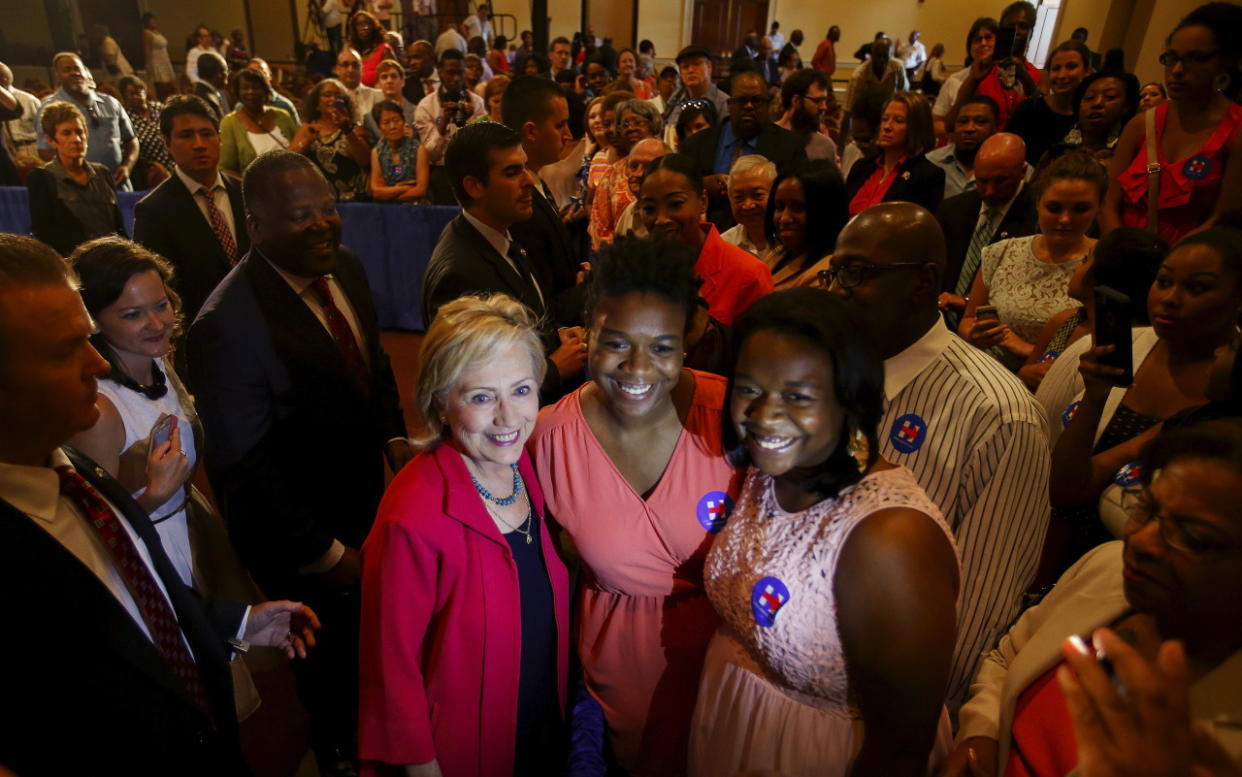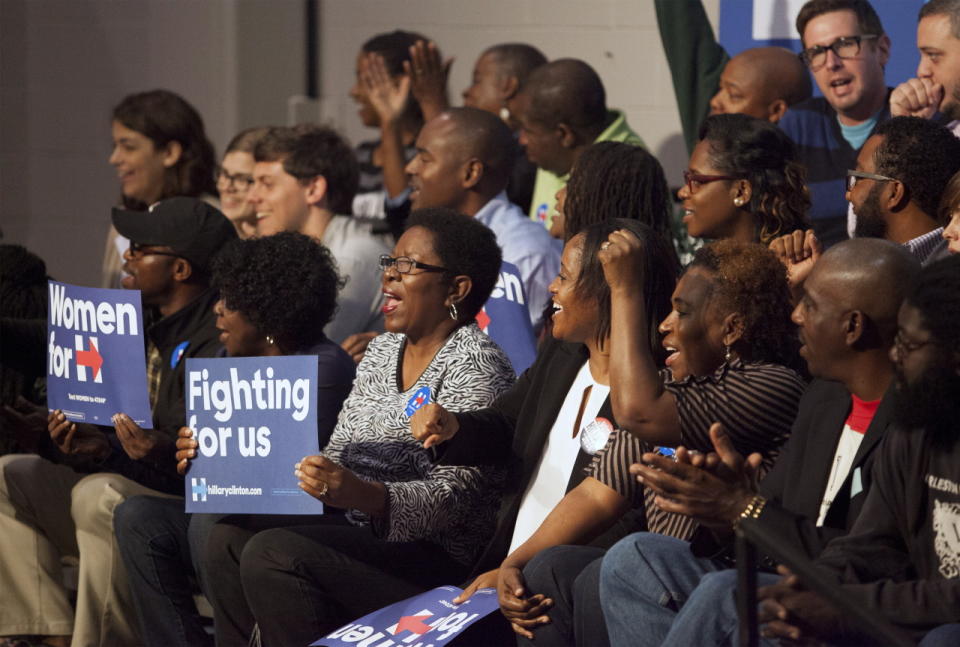Hillary Clinton’s strategy to woo black voters involves a ‘comprehensive’ policy agenda

Hillary Clinton poses for a picture with supporters in West Columbia, S.C., in July. (Photo: Chris Keane/Reuters)
Democratic frontrunner Hillary Clinton has personally directed her presidential campaign to make a major push to secure support among the African-American community.
Yahoo News has obtained a copy of a memo that was sent by top Clinton aides to key supporters on Tuesday that detailed her strategy for African-American outreach. It included details on her organizing in key primary states, the messages Clinton’s team will highlight for black voters, and plans to put some serious star power behind the effort.
Clinton’s African-American outreach push is likely an acknowledgement of how crucial the bloc could be for her 2016 chances.
President Obama’s victories in 2008 and 2012 were aided by high turnout of over 65 percent of African-American voters, who are a core part of the Democratic base. Black turnout was, on average, 8.8 percent higher in the two presidential elections featuring Obama than it was in the prior three races.
A key question surrounding Clinton’s candidacy is whether she can come close to the success that Obama, the first African-American president, had with the community. In an analysis published in July, the Cook Political Report’s Amy Walter and David Wasserman described this question as a likely “key to 2016.″ They noted, “A return to pre-2008 African-American turnout levels wouldn’t necessarily doom a Hillary Clinton candidacy, but it would leave her with a whole lot less margin for error in a host of swing states.”
“Deconstructing exit poll data from 2012, African-American voters accounted for Obama’s entire margin of victory in seven states: Florida, Maryland, Michigan, Nevada, Ohio, Pennsylvania and Virginia. Without these states’ 112 electoral votes, Obama would have lost decisively,” Walter and Wasserman wrote, adding, “African-Americans also accounted for almost all of Obama’s margin in Wisconsin. All of these states, except Maryland, will be crucial 2016 battlegrounds.”
While Clinton enjoys high favorability ratings with black voters, there is good reason for her to put in extra effort. During her 2008 primary bid, Clinton’s husband, former-President Bill Clinton, launched a series of attacks on Obama that were widely criticized in the African-American community.
African-American outreach will clearly be crucial for Clinton if she secures the Democratic nomination. It also could be a major asset for her in the primary. A lack of black support has been a glaring vulnerability for Clinton’s top rival, Sen. Bernie Sanders (I-Vt.).
Based on the memo, Clinton’s plan to win the African-American vote is two-pronged. It includes an aggressive ground game and policies that the campaign believes are tailored to the community’s interests, including a commitment to address concerns about police violence. The memo, titled “The Importance of the African-American Vote,” suggested this plan to woo the community is a crucial part of Clinton’s overall election strategy. It described Clinton’s platform as “the most comprehensive agenda to help African American families get ahead and stay ahead.”
The memo was authored by a trio of top Clinton campaign staffers: her director of state campaigns and political engagement, Marlon Marshall; the campaign’s African American outreach director, LaDavia Drane; and senior policy adviser Maya Harris. It described Clinton as being “in a strong position to be successful in key states where the African American vote is critical to winning the primary and the general election.”
“At Hillary’s direction, our campaign has focused on working to earn the support of the entire community,” the memo said.
The memo noted the Clinton campaign has built “a volunteer base in Super Tuesday and March primary states.” It said they have focused on outreach in “places of worship, community centers,” on social media, and at “organizing events” held at a variety of locations “including at barber shops.” According to the memo, 1,100 of these events have taken place in South Carolina where the African-American community is expected to make up a majority of the primary electorate. Additionally, the memo noted Clinton will make personal appearances in states that are holding March primaries and at historically black colleges and universities.
After outlining Clinton’s organizational efforts in the African-American community, the campaign memo went on to tout her poll numbers. It highlighted national polls that show Clinton is currently well ahead of Sanders among African Americans, including an NBC poll released Oct. 16 that shows her beating him in the black community by over 50 percent. The memo also pointed out a trio of polls that show Clinton is ahead of Sanders by more than 40 point margins in South Carolina.
Clinton’s edge over Sanders in South Carolina, which is one of the four first primary states, could prove especially crucial. Multiple state polls show Sanders narrowly ahead of Clinton in New Hampshire. If Sanders maintains his lead in New Hampshire, Clinton could dull any momentum he gains from that win with a victory in South Carolina, which is the next state on the primary schedule. The memo showed her campaign wants to capitalize on Clinton’s strong favorability in the African-American community as it attempts to lock down the Tar Heel State.
Clinton’s standing among black Democrats is clearly a major asset for her in South Carolina. A Winthrop University poll released Thursday morning, after the memo was written, showed 80 percent of African-American Democratic primary voters in the state support her while just 15 percent back Sanders.
Along with her poll numbers, the Clinton campaign’s memo boasted about the wide array of endorsements she has received from prominent African-American leaders including over 50 mayors, Sen. Cory Booker (D-N.J.), former diplomat and civil rights leader Andrew Young, and 33 of the 46 members of the Congressional Black Caucus. In addition to these political figures, the memo rattled off endorsements Clinton has received from celebrities like the singers Pharrell Williams and John Legend, basketball icon Magic Johnson, and the rapper-slash-actor Common. The memo claimed these stars are all set to act as surrogates for Clinton on the campaign trail.

Clinton has gained the endorsement of Pharrell Williams and numerous other African-American celebrities. (Photo: Sara Gangsted/Scanpix Denmark/Reuters)
“These surrogates will be deployed to the early four, Super Tuesday and other March states to meet voters where they are, and discuss why they support Hillary Clinton and how she has fought for families and children her entire career,” the memo said. “They will also participate in a number of TV and radio interviews to further amplify this message.”
The memo concluded by citing a slew of policies Clinton is pushing that it described as “bold proposals that benefit the African-American community.” It made clear Clinton will attempt to connect her economic agenda to race.
“Hillary Clinton knows that race remains a driving factor in determining who gets ahead and who gets left behind in America, and that our community continues to face many challenges, including economic and social disparities,” the memo explained.
Based on the memo, the Clinton campaign’s pitch to black voters is focused on her push to raise the minimum wage, support for Obamacare, efforts to alleviate student debt and her call for universal pre-K. The memo also claimed Clinton will “repair the Voting Rights Act and implement universal, automatic voter registration” while Republicans “attempt to restrict voting access.” It did not outline her specific plan for achieving this with a GOP-led Congress.
Additionally, the memo specifically stressed Clinton’s positions on criminal justice reform and policing as part of her potential appeal with African-Americans. It also revealed how her campaign plans to frame these issues.
On Monday, Clinton had a meeting in Chicago with mothers who lost their children to gun violence. That gathering included parents of people who died in prominent police-involved shootings. The memo said the meeting “spotlighted two key issues: the epidemic of gun violence which demands commonsense gun reforms and the sense of distrust that too often exists between law enforcement and the communities they serve.”
“Hillary and the family members discussed the need to deliver real reforms that can be felt on our streets, such as her policies to address gun violence, including requiring comprehensive background checks, and policing practices, including body cameras,” the memo said.
The memo also noted Clinton detailed “three additional components of her agenda to reform our criminal justice system” last week when she expressed support for “legislation to ban racial profiling by federal, state, and local law enforcement officials,” an elimination of “sentencing disparities for crack and powder cocaine,” and for taking executive action to stop “the federal government and its contractors from asking about criminal history at the initial application stage.”

Clinton supporters cheer during a speech the candidate gave to members of the International Longshoremen’s Association in Charleston, S.C. (Photo: Randall Hill/Reuters)
Overall, the memo described these policy positions as the presidential campaign platform best suited to the needs of the black community.
“Of all the candidates in the race for President, Hillary Clinton has the most comprehensive agenda to help African American families get ahead and stay ahead. She will continue to build on these proposals throughout the campaign,” the memo said.
Read the complete memo below.
Hillary Clinton Campaign Memo on the African American Vote


